Perform a free Maine warrant search in just minutes and confirm there are no active orders calling for your arrest or the arrest of someone you know.
Maine allows the general public access to official government records unless they’re considered protected due to an ongoing investigation or another special circumstance.
This resource covers the most convenient and efficient warrant lookup methods in Maine, as these records are publicly available due to state and federal public record laws. Check out the links and steps in this article for the best ways to find details on anyone wanted throughout the state.
Are Warrants Available for Maine Citizens To View?
The Maine Freedom of Access Act protects the public’s right to information about actions taken by the government as long as they don’t pose a threat to governmental interests or the privacy of individuals.1
This means several types of public records are available for review within the state. This is to ensure the government remains accountable to the citizens, emphasizing transparency in governmental operations.
Among the information accessible to the public is criminal record history which may include several types of warrants. While not all warrants will be immediately available to the public, as that could interfere with law enforcement, many types are.
Warrants may appear in court records, as these orders are typically issued by judges. Access may be provided through a phone call or a formal record request. Formal requests can be done online, in person or via mail.
Finding Warrants in Maine: At a Glance
Conducting a warrant search is a streamlined process once the requester knows how to do so; in Maine, records are often kept at the county or district level, but they may be requested from state departments as well.
To locate the correct individual with a warrant, certain information must be provided during a record request. At a bare minimum, it’s important to have a first and last name to ensure the records are for the correct person. If someone has a common name, a search may turn up records for multiple individuals.
Being able to provide more specific information during a search can help narrow down the scope of the results. It’s useful to know where the warrant was issued or the state the individual lives in. Having a date of birth can further narrow down the results to help locate the correct person.
Information can be searched on several levels. Warrants may appear on state-provided criminal histories, though official records often come with additional fees. They can also be issued at the county or municipal level and may be requested from these agencies.
In some cases, there may be federal warrants for an individual, though these are not as common. There are several types of warrants for various purposes, and the most common are detailed below.
How To Run an Online Maine Warrant Search on Yourself or Someone Else
Maine doesn’t have a statewide online database specific to warrants available to the public, but warrant information may be available by performing a criminal record check.
Records are held in the State Bureau of Identification (SBI), which is part of the Maine State Police. It was created in 1937 to collect, file, preserve and distribute records pertaining to crimes within the state.
The SBI runs the Criminal History Record Information program, which allows for online searches of criminal records using the Maine Criminal History Record & Juvenile Crime Information Request Service.
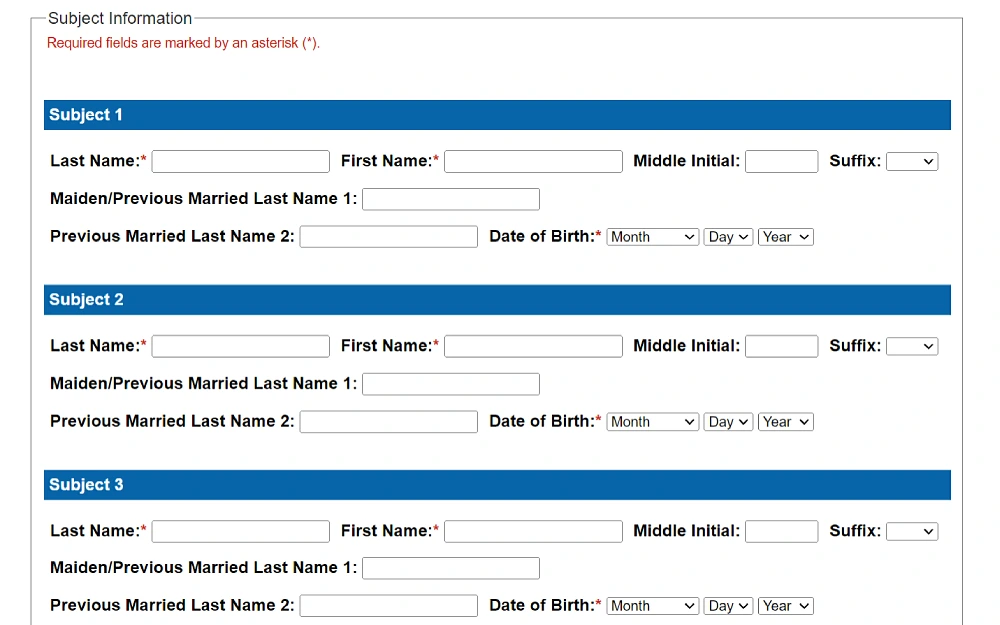
Users must enter payment information with the fee schedule listed on the webpage ($31 for non-subscribers or those out of state and $21 for Maine InforME subscribers), and notarized reports can be requested for $10. From there, users may search with the subject’s full name and date of birth.
After searching for the individual, two possible results are returned: “No match was found for your request” means there’s no criminal history on the individual you searched for. The second result may be a record with conviction information and pending charges that are less than a year old. This may reveal arrest warrants, as according to state legislature, the Maine State Police is the state custodian for these orders.
Criminal history is also available via mail by completing a Request for Record Search Form and sending it with payment to:3
Judicial Branch Service Center
PO Box 266
Lewiston, ME 04243
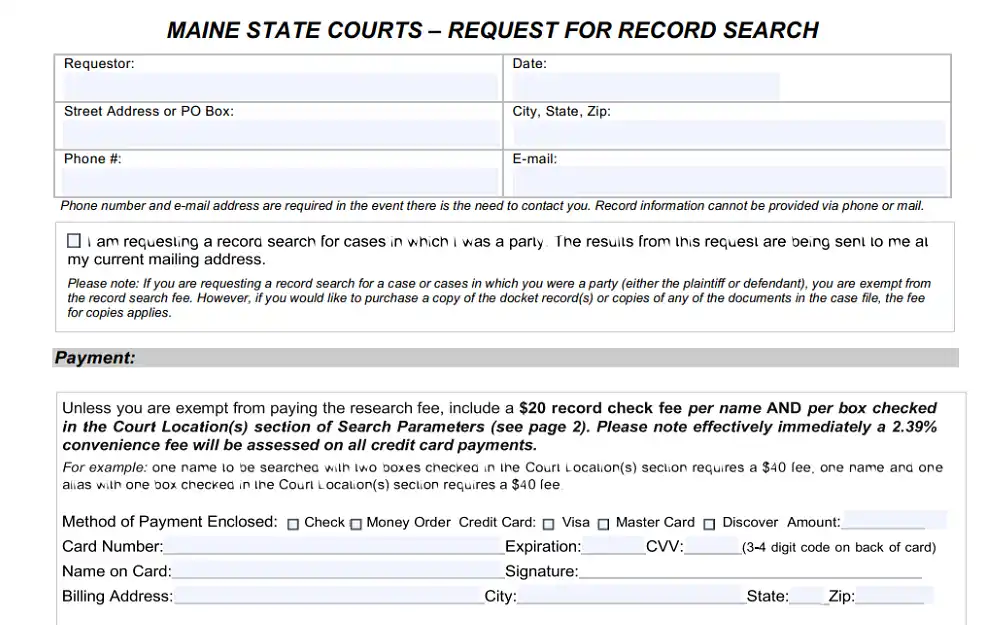
Gather Warrant Information in Maine at the County Level
A warrant search in Maine can be obtained by requesting criminal history records on InforME as outlined in the previous section. On the county level, it’s possible to request warrant records from the superior courts. The court clerks will likely have access to these records and can provide them upon request by contacting the court clerk.
A list of the state’s superior courts can be found online for ease of access.4 The most populous include:
York County Superior Court
515 Elm St.
Biddeford, Maine 04005
Phone: 207.283.6000
Penobscot County Superior Court
78 Exchange St., Suite 78
Bangor, Maine 04401
Phone: 207.561.2300
Kennebec County Superior Court
1 Court Street, Suite 101
Augusta, ME 04330
Phone: (207)-213-2800
Androscoggin County Superior Court
2 Turner Street
Auburn, ME 04210
Phone: (207)-330-7500
In Cumberland County, warrant information may be available with the county Sheriff’s Office Fugitive/Warrants Section. While records will require a fee to be paid in cash, check or money order payable to the Cumberland County Sheriff’s Office, this should assist in the warrant search process. Keep in mind that the research fee for searching and compiling records is $25 per hour after two hours.
Complete a records request using the online Records Request Form, in person, by mail, by fax or via email.5
The form should be filled out as thoroughly as possible.
Cumberland County Sheriff’s Office
Attn: Records Department
36 County Way
Portland, ME 04102
Phone: (207)-774-1444 ext. 2249
Fax: (207)-828-2357
Email: [email protected]
Retrieve Warrant Records via Municipal Courts & Law Enforcement Agencies in Maine
In municipalities across Maine, the easiest way to access information about warrants is to contact the presiding district court directly. The State of Maine Judicial Branch offers a list of district courts across the state. Contact the court clerks directly to ask about requesting records.6
When making a Freedom of Access Act (FOAA) Public Records Request in Portland, the recommended starting point is the Portland Public Records Request Form online.7
As the Portland Police Department has its Special Reaction Team (SRT) for enforcing warrants and handling other extreme situations, they hold some warrant information within their database.
Portland Police Department
109 Middle Street
Portland, ME 04101
Phone: (207)-874-8479
Other sources that may be useful include the district courts. Find their contact information at:
Lewiston District Court
71 Lisbon Street
Lewiston, ME 04240
Phone: (207)-795-4800
Bangor District Court
Penobscot Judicial Center
78 Exchange St.
Bangor, Maine 04401
Phone: 207.561.2300
Biddeford District Court
515 Elm St.
Biddeford, Maine 04005
Phone: 207.283.6000
Augusta District Court
1 Court Street, Suite 101
Augusta, ME 04330
Phone: (207)-213-2800
Broaden the Search From Maine to Federally Issued Warrants
While federal warrants are not issued frequently, knowing how to review them can be useful. Many federal government agencies maintain lists of those wanted for criminal actions, which can be reviewed online.
The Federal Bureau of Investigation (FBI), U.S. Drug Enforcement Administration (DEA) and U.S. Marshals Service maintain most wanted lists that show their highest priorities.8
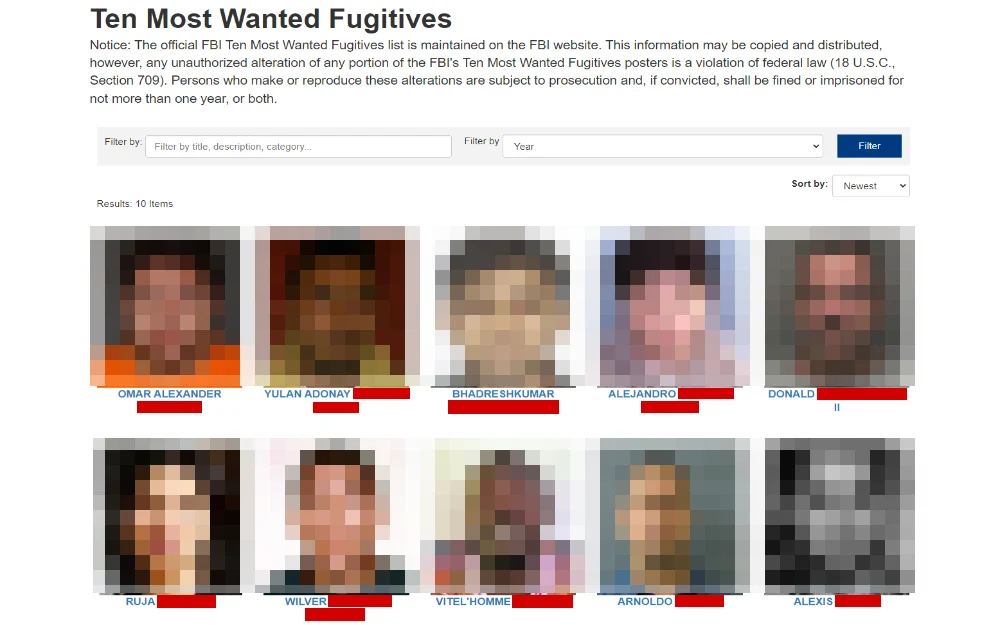
However, to do more thorough research into federal warrants, other avenues are often more fruitful.
Individuals can search federal records with the Public Access to Court Electronic Records (PACER) service.9
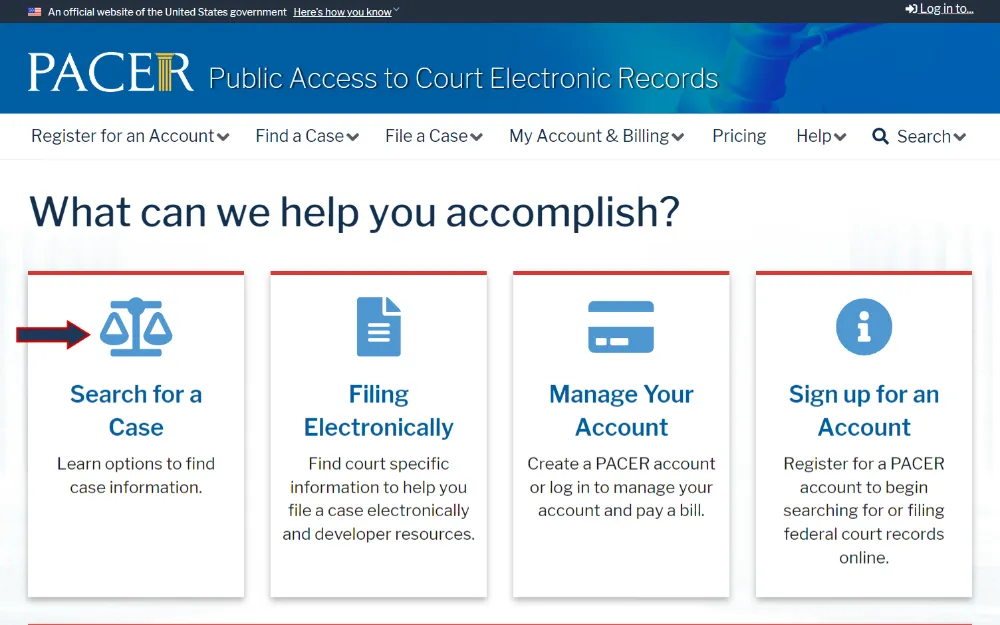
This allows for over a billion documents that have been filed with federal courts across the country to be accessed and reviewed.
To use this tool, individuals must first register for an account. From there, they can review cases in the federal court or peruse a nationwide index of federal court cases to locate the records they seek.
PACER offers a service center that can assist with the process. To contact the service center, call +1-800-676-6856 weekdays between the hours of 7 a.m. and 6 p.m. CT or email [email protected].
PACER requires certain fees to be assessed for services, which can be reviewed on the Electronic Public Access Fee Schedule.10 These records come with a cost of $0.10 per page, though the cost for access to a single document is capped at $3, which comes out to 30 pages for a specific report. However, name search results, transcripts of federal court proceedings and reports not linked to a specific case may accrue additional charges.
In some cases, there are no fees generated for searches. The terms of free access and exemptions can be reviewed on the Electronic Public Access Fee Schedule; those who accrue $30 or less in charges within a quarter have their fees waived, and PACER reports that 75% of users don’t pay this fee.
Hiring an attorney can also assist in locating federal warrants. They can submit FOIA requests through the U.S. Marshals Service.
Types of Warrants in Maine & What Each Means
A judge can issue a warrant allowing law enforcement to take an action that would typically be deemed an infringement on an individual’s rights. For example, a warrant can allow a police officer to search a home or private vehicle. The warrant justifies certain set behaviors as outlined by a judge.
When a warrant has been issued and can be enacted, it’s considered active. In Maine, warrants calling for the arrest of an individual don’t expire. A search warrant for the location information of an electronic device must be enforced within 14 days before it expires unless it’s been extended, but extensions can’t extend 30 days.11
Because most warrants don’t expire and can be executed at any time unless they are recalled or quashed by a judge, it’s important to handle them promptly if they’re discovered.
Warrants can be granted for various reasons, though they typically call for either the arrest or the right to search and seize property. A warrant search may reveal one of several types of orders. The following are among the most common that people encounter in Maine, but this isn’t an exhaustive list.
- Arrest Warrants: An arrest warrant calls for the arrest of an individual. Typically, it’s ordered after a prosecutor provides reasonable proof that the named individual has committed a crime while not in the presence of a police officer.
- Bench Warrants: Bench warrants are issued to bring an individual to court and may be written for several reasons. Most frequently, they’re issued due to an individual not attending court when they’ve been summoned or subpoenaed. They can also be issued for failing to pay a court fine or failing to attend court after a probation or parole violation.
- Probation Violation Warrant: Maine issues these as a type of bench warrant to revoke probation or supervised release after a violation. They may be requested by probation officers or prosecutors and allow the named individual to be arrested and brought to court.
- Capias & Capias Pro Fine Warrants: A capias warrant is issued if an individual fails to follow a court order or doesn’t appear in court when they’ve been summoned. A capias pro fine warrant refers to a warrant issued for failure to make payments in accordance to a court order.
- Extradition Warrants: Sometimes called fugitive or governor’s warrants, these allow a named individual to be arrested outside of the jurisdiction in which a crime was committed. The arrested individual is then typically extradited or sent to the jurisdiction waiting to try them.
- Search Warrants: Search warrants allow law enforcement to search a specific location. This is typically to find evidence of a crime. This warrant grants access to an individual’s home, vehicle or place of work based on details listed by the signing judge.
Dealing With Warrants & Notifying or Reporting Persons of Interest in Maine
If the warrant search process reveals there’s an order for your arrest or the arrest of someone you know, it’s important to act promptly and preemptively.
Warrants may be enforced at any time an individual comes into contact with law enforcement, such as if they’re pulled over for a traffic infraction. To avoid being arrested after a simple speeding ticket, handling a warrant as soon as it is detected is recommended.
If someone you know has a warrant out, it may be prudent to inform them if it’s safe to do so. Trusted individuals who have a warrant for failing to appear or failing to pay a fine likely don’t pose a risk when warning them of warrants discovered in their name. However, if the person with a warrant poses a threat to you, themselves or others, getting law enforcement involved is the right move.
If the person with a warrant is actively committing a crime, contacting 911 is the quickest way to resolve the issue. However, you can also contact local authorities at their non-emergency line or crime tip hotline. The Maine State Police keeps a list that can help people identify the correct station to contact to report a crime.12
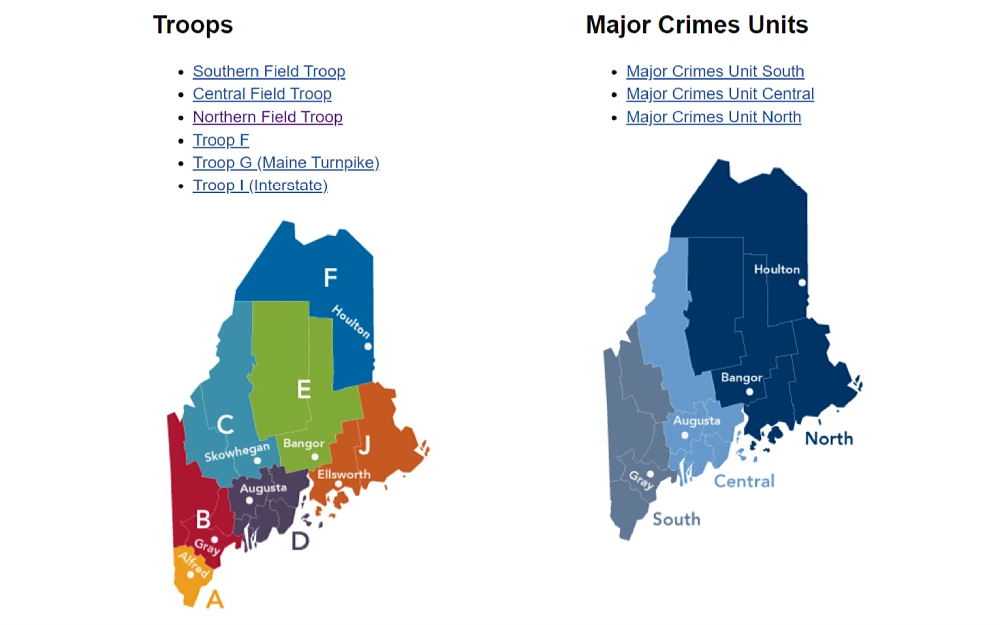
If the warrant is in your name, various steps can be taken to handle the issue quickly. Typically, these are to resolve the warrant by complying with the terms that went unmet, hiring an attorney or turning yourself in. Prior to resolving the warrant, notify a trusted friend or family member, as you may be taken into custody temporarily.
Some warrants can be resolved simply by paying the appropriate fines or setting a court date to appear. Contacting the issuing court or agency can help with this process. Keep in mind that if you enter a police department or come into contact with law enforcement at this time they can, and likely will, arrest you on the spot.
Hiring an experienced defense attorney may also be a valid option for resolving a warrant. The attorney should be able to assist you in navigating the legal system quickly while keeping your rights intact.
They can help with setting court dates and can appear in court to speak for you. They may also be able to argue against the warrant and request for it to be quashed.
Turning yourself in is another valid response, and in doing so willingly, you retain some control over the situation. You can take the time to hire an attorney and meet with a bail bondsman prior to surrendering yourself to ensure all your affairs are handled ahead of time.
If a Maine warrant search reveals an active warrant, this can help you get a court date quicker and already have access to funds to be bonded out of jail, ideally the same day.
Access additional information on individuals throughout the state by following the guidance within the Maine free public record lookup overview (for details on court cases, background checks, vital records, etc.) and the tutorial on retrieving ME arrest and criminal records.
References
1Maine Government. (n.d.). Your Right to Know: Maine’s Freedom of Access Act. Retrieved March 13, 2024, from <https://www.maine.gov/foaa/>
2Maine State Police, Department of Public Safety. (n.d.). Maine Criminal History Record & Juvenile Crime Information Request – Subject Information. Retrieved March 13, 2024, from <https://apps1.web.maine.gov/cgi-bin/online/pcr/cc_step01.pl?>
3Maine State Courts. (2015, October). Request for Record Search – All Courts and VB. Retrieved March 13, 2024, from <https://www.courts.maine.gov/forms/pdf/misc/request-records-search.pdf>
4State of Maine Judicial Branch. (n.d.) Superior Court. Retrieved March 13, 2024, from <https://www.courts.maine.gov/courts/superior/index.html>
5Cumberland County Sheriff’s Office. (n.d.). Records Request Form. Retrieved March 13, 2024, from <https://www.cumberlandso.org/law_enforcement/records_request_form.php>
6State of Maine Judicial Branch. (n.d.) District Court. Retrieved March 13, 2024, from <https://www.courts.maine.gov/courts/district/index.html>
7City of Portland, Maine. (n.d.). Public Records Requests (FOAA). Retrieved March 13, 2024, from <https://www.portlandmaine.gov/1228/Public-Records-Requests-FOAA>
8Federal Bureau of Investigation. (n.d.). Ten Most Wanted Fugitives. Retrieved March 13, 2024, from <https://www.fbi.gov/wanted/topten>
9Public Access to Court Electronic Records. (2024). PACER: Federal Court Records. Retrieved March 13, 2024, from <https://pacer.uscourts.gov/>
10United States Courts. (2019, December 31). Electronic Public Access Fee Schedule. Retrieved March 13, 2024, from <https://www.uscourts.gov/services-forms/fees/electronic-public-access-fee-schedule>
11Maine Legislature. (2023, October 30). Title 16, §648: Search warrant needed for acquisition of location information. Retrieved March 13, 2024, from <https://legislature.maine.gov/statutes/16/title16sec648.html>
12Maine State Police, Department of Public Safety. (n.d.). Report a Crime. Retrieved March 13, 2024, from <https://www.maine.gov/dps/msp/about/report-crime>
